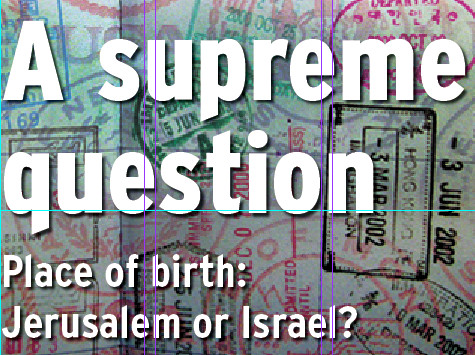Supreme Court, Israel and the passport case
In terms of foreign policy and diplomacy, Jerusalem has always been different. Proposed as an international zone by the United Nations in 1947, it was instead divided between Israel and Jordan, and completely annexed by Israel in 1967. Overwhelming majorities in Congress have reaffirmed its status as the Israeli capital, but for Americans born in Jerusalem, the line on the passport remains without a country, printed simply as Jerusalem. The omission of Israel’s name is a question now before the United States Supreme Court.
“The government claims that this is a political question, which is something that courts cannot decide. This case was never intended as a grant of recognition power,” said Alyza Lewin, the Washington-based attorney representing 8-year-old Menachem Zivotofsky, an American citizen born in Jerusalem, whose parents Naomi and Rabbi Ari Zivotofsky demanded that his birthplace be listed as “Jerusalem, Israel” instead of its present singular word, “Jerusalem.” Formerly from West Hempstead, the couple made aliyah 11 years ago.
In 2002, Congress passed a law requiring the State Department to include the country of birth, if requested to do so, by the applicant. President George W. Bush signed the bill, but with a major caveat. Arguing that foreign policy was up to the president, Bush’s signature came with a “signing statement” disagreeing with Congress’ power to force the Jewish state’s name onto the passport.
Lewin disagrees, citing a similar 1994 law passed by Congress and enforced by the president where Taiwan is listed as a place of birth, despite the island nation’s non-recognition by the United States, and the offense that it caused to China, which views Taiwan as a breakaway province. In addition, citizens born within Israel proper, who do not wish to have Israel listed as a place of birth, can simply write Haifa or any other city. Citizens born in British Palestine before 1948 can also list Palestine, even though it was never an independent country. “The State Department also allows individuals to list the West Bank too, and it’s not a county,” Lewin added. “A passport does not recognize sovereignty. Countries can be taken off passports and citizens can self-identify as they choose.”
Eric Friedman, a constitutional law professor at Hofstra, argues the exact opposite, predicting defeat for Zivotofsky. “The power to receive ambassadors is the power to recognize a piece of land. Congress can control the funding in foreign policy, but recognition of countries belongs to the president,” Friedman said. “For example, President Nixon’s recognition of Red China was also challenged in court and upheld.”
Friedman took on the president in 2008, successfully arguing before the Supreme Court for a Guantanamo detainee’s right to challenge his detention. Nevertheless, Friedman is not optimistic on Zivotofsky. “The court has sympathy for the executive branch. Alito, Scalia and Roberts all worked for past presidents and the new justice Elena Kagan is a former solicitor general,” Friedman said.
As part of the brief to the highest court, Zivotofsky counts some 52,569 citizens who share Menachem Zivotofsky’s predicament. “The purpose of a passport is for identification, and it is indisputable that Jerusalem is in Israel. The Supreme Court should insist that the State Department follow the law,” said ADL director Abraham Foxman, whose organization filed an amicus brief in support of Zivotofsky. The case will be heard in November before the Supreme Court.
“We are proud to have assembled the most significant and broad-based coalition of American Jewish organizations in recent memory,” Foxman said. “We are all united in the belief that this is an issue that transcends Israeli-Palestinian politics.”

 49.0°,
Fair
49.0°,
Fair 




